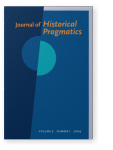Vol. 5:1 (2004) ► pp.1–26
A critique of Levinson’s view of Q- and M-inferences in historical pragmatics
In Presumptive Meanings: The Theory of Conversational Implicature, Levinson (2000) argues that in historical as well as synchronic work there is need to distinguish three types of pragmatic principles, which he labels the Q-, M-, and I- “heuristics”. This is in contrast to Horn (1984), who argues for two types of “principles”: Q- and R-. In the present paper I argue that the proposed distinction between Q- and M- Heuristics is not necessary or consistently maintainable. Two of Levinson’s examples are considered: the development of anaphora (reflexive -self in English), and constraints on innovations in word formation (e.g. informer/informant). The conclusion is that a single heuristic (Q) is adequate, as proposed by Horn.
Cited by (9)
Cited by 9 other publications
This list is based on CrossRef data as of 4 july 2024. Please note that it may not be complete. Sources presented here have been supplied by the respective publishers. Any errors therein should be reported to them.
